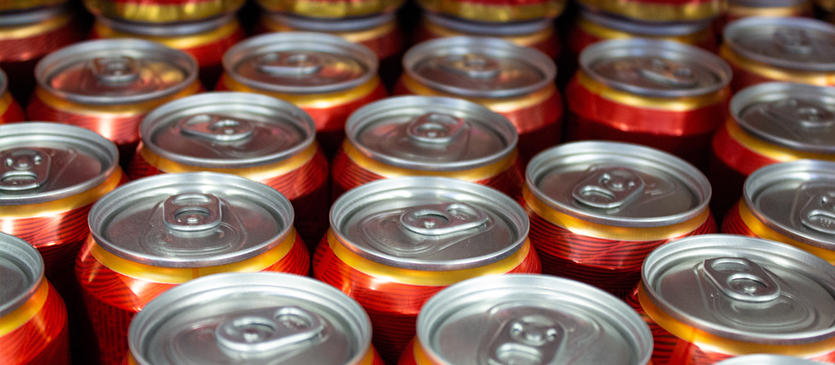During the pandemic, with bars and restaurants closing their doors, people began to bring the bar home, increasing sales of packs of beer, seltzer, and other ready-to-drink beverages. Even after doors reopened, this trend continues.
A shift is afoot in the food and beverage industry. Companies are producing more products in aluminum cans than glass bottles and other glass containers. The craft beer aisle, once populated by dark glass bottles, is now adorned with cans of all sizes and colors.
Why are so many industries pivoting to using aluminum?
Advantages of Aluminum
Switching to aluminum cans clears valuable space in a manufacturing facility. Cans take up less room, and canning lines typically have less square footage than bottling lines.
Other advantages of aluminum:
- lightweight, therefore cheap to transport
- effective light and oxygen barrier
- recyclable
- multiple size options
- non-toxic
Consumers love cans for many of the same reasons manufacturers do: they are easy to take on the go. They keep drinks fresher for longer. They can be crushed after use, taking up less space in the recycling bin.
Is Glass Going Extinct?
Glass is still the expectation for many products, especially those considered high-end. You’d probably be pretty disappointed if you ordered expensive wine at a fine dining restaurant and the server brought it to you in a can.
Glass has its advantages—it’s:
- natural
- recyclable
- re-usable
- impermeable without additional barriers or additives
Glass is also a sustainable choice and an aesthetically-pleasing one. Consumers expect their favorite bottle of wine or bourbon to come in the glass bottle they’ve come to love.
Supply Chain Shortage
Labor shortages, global politics, severe weather, and a range of other events have made aluminum and glass more expensive and sometimes impossible to find. Most glass is produced overseas where a lack of shipping containers and workers at the ports has contributed to a glass bottle shortage. But even those who produce their own glass bottles have suffered from shortages of raw materials.
Aluminum is running low as well. Trafigura Group warns that aluminum stockpiles will be completely depleted by 2024. Regulations in China, the largest supplier of aluminum for the global market, have slowed their aluminum production.
Supply chain issues affect everyone from the microbrewery down the street to the world’s largest beverage supplier, Coca-Cola, whose product has sporadically gone missing from grocery store shelves throughout the year.
The cost of these supplies is reaching record highs, and consumers are paying the price. The supply chain shortage is contributing to the cost of some grocery items doubling and causing strain on American families.
Maintaining Supply Amid Shortages
It’s best to plan and prepare to adapt to evolving challenges in global supply. Relying on one type of packaging for beverages can cause a shortage of that material to completely shut a business down. Creativity and flexibility are key to surviving.
- Plan material requirements on an annual and ongoing basis.
- Adopt AI for accurate sales forecasting.
- Partner with multiple raw material suppliers.
Frequent evaluation of the annual plan allows a company to react quickly to unforeseen changes. Preparing to make changes quickly according to market trends will help your business stay afloat no matter what lies ahead.
When adding increased options for packaging, it’s crucial to have technology that is compatible with all materials. Major companies like Anheuser-Busch have prepared their business for unexpected changes with machinery that can be used for glass and aluminum.
A Printer for Every Job
Built to withstand any environment, REA JET technology is a one-time investment that will be useful no matter which direction your business turns. REA JET systems can code and mark a variety of materials from cardboard, to glass and aluminum.
In the food and beverage industry, accurate coding and marking are essential. REA JET technology allows for process analysis and traceability. Our coding and marking solutions can meet any need you have from printing expiration dates, batch numbers, and other important codes.
Our Small Character inkjet printer can print 1 to 8-line texts, barcodes, logos, and more in high-resolution up to 12 millimeters. This printer boasts high speeds, quick drying times, and works well on glass bottles or aluminum cans.
All of REA JET’s products allow your business to be more flexible. Our systems are easy to install and integrate with your production equipment with an interface that is user-friendly, with minimal training required to operate.

